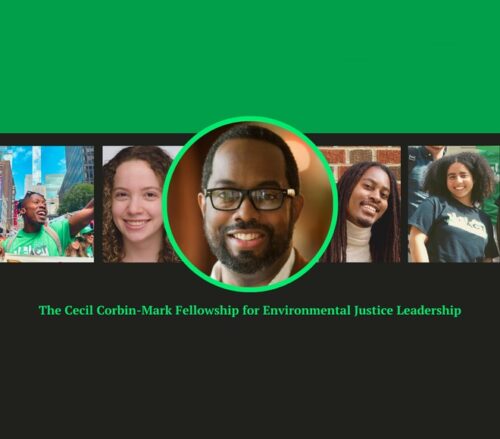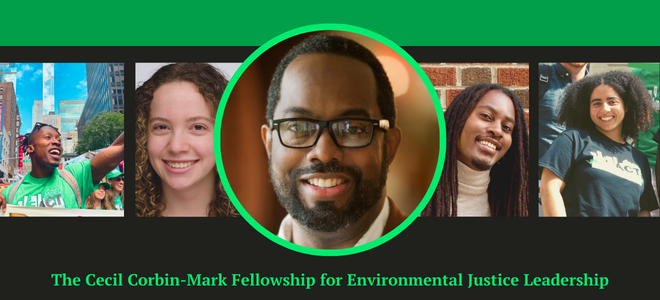
In 2022, WE ACT for Environmental Justice launched the Cecil Corbin-Mark Fellowship for Environmental Justice Leadership as a unique opportunity for young people to continue to follow in our late Deputy Director Cecil’s footsteps, and to launch them on a career path to become the next generation of environmental justice leaders. Since then, we’ve had two cohorts of fellows so far. Read on to learn more about them and what they’ve accomplished in their time with us.
Elizabeth Reyes ‘22
Elizabeth Reyes was a Cecil Corbin-Mark Fellow in 2022. She supported the policy team, helping advance our policy work on toxic chemicals as well as engaging members on these issues. This included strengthening state and city legislation to prevent childhood lead poisoning, a cause which Cecil was particularly passionate about. During her time as a fellow, Liz was able to accomplish everything she wanted to and more. She got to testify at various City Council oversight hearings, speak with State legislators about bills we were advancing, and connect with many WE ACT members and Northern Manhattan residents about their different experiences with toxics. She even had the opportunity to travel halfway across the world to help with our Climate Justice Pavilion at COP27 in Egypt!
After her fellowship, Elizabeth was offered a position at WE ACT as the Toxics Policy Campaigns Coordinator, where she works on the same focus area that she did as a fellow but with more opportunity and creativity to pursue different campaigns that advance all of our toxic work. She is currently working on the Beauty Justice Fairs, where WE ACT is advocating for the New York Beauty Justice Bill, which bans toxic chemicals in our personal care products, especially those marketed towards women of color.
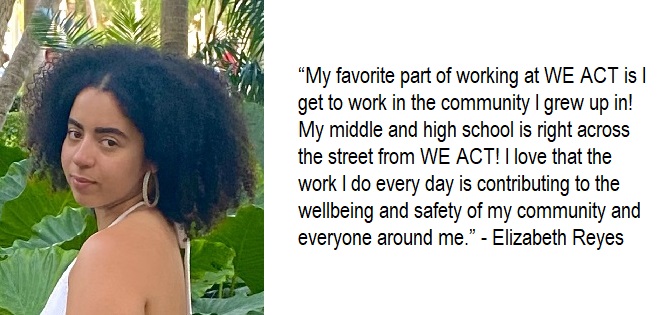
Tali Natter ‘23
Tali Natter is a current fellow and is on the research team in our Federal Policy Office in Washington, DC, where she works under the supervision of Federal Research Manager Manuel Salgado. Tali works on research, mapping, and data analysis to support efforts toward equitable and just environmental practices and legislation. The biggest project Tali is working on right now is WE ACT’s forthcoming congressional accountability report, to be released this spring. The report will illustrate the role of congress members in advancing environmental justice as well as each representative’s strengths and shortcomings so that constituents can hold their representatives accountable.
Tali’s other accomplishments include creating Justice40rward storymaps to recap the community tours from last year, contributing to various research and analysis on emerging energy policies, specifically false solutions like hydrogen and liquefied natural gas, and supporting analysis of proposed federal laws, rules, and tools to prioritize environmental justice communities in legislation. Tali’s long-term goal for this fellowship is to continue contributing to research that advances community advocacy and supports implementation of equitable policy.
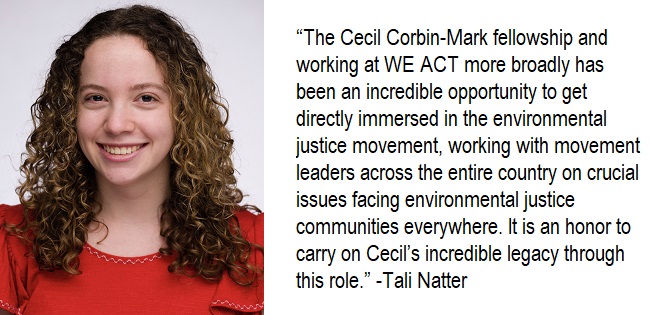
Cameron Clarke ‘23
Cameron Clarke is a current fellow who primarily works with the Environmental Health team on research and education projects that impact residents of Northern Manhattan and the rest of New York State. His background is in medicine (he is currently taking a research year from medical school at Columbia University), so his main focus has been researching asthma, but he has also helped support the work of the Climate Justice Working Group, including the Climate Ready Uptown Plan campaign, which provides extreme heat and disaster preparedness workshops to communities across Northern Manhattan, and the Our Homes Under Our Control campaign, which aims to keep New York affordable for tenants by advocating for universal rent stabilization and ending subsidies to natural gas utilities, reinvesting the savings into community renewable energy projects and capping the costs of utilities for New Yorkers.
Right now Cameron is finishing an asthma policy report for WE ACT. When it’s released, the hope is that the report will provide a holistic and comprehensive assessment of the policy steps that New York State can take to create a healthier and more supportive infrastructure for its residents with asthma. Aside from the upcoming policy report and the community research guide, Cameron has been most proud of the work he’s done in leading workshops and presentations for our community, whether on climate change-related disasters or the ways that our policy landscape and the built environment can impact asthma.

Caleb Smith ‘22
As a Cecil Corbin-Mark Fellow, Caleb Smith’s scope of work revolved around resiliency, climate change, and energy research and advocacy. This included facilitating community outreach for the Long-term Energy Plan (Power Up NYC!) and utility debt workshops, providing research and testimony at city hearings and a Con Edison rate case, and supporting the Better Buildings New York coalition, which focuses on policies to transition the State off gas.
While still serving as a fellow, Caleb urged a majority co-sponsorship of Local Law 032 of 2023, phasing down the use of fuel oil number 4 by 2027 instead of 2030. They also launched our statewide Extreme Heat Coalition, advancing the goals of the Heat, Health, and Equity campaign by building a movement toward resilience, adaptation, and mitigation against extreme heat grounded in the disproportionate burden placed on urban disadvantaged communities.
Caleb is currently a lead facilitator of the Extreme Heat Coalition and represents WE ACT on the Rainproof NYC flood adaptation strategy co-design initiative with several city agencies and a diverse group of stakeholders. Their goals include getting the Cooling Center program funded and codified in the City charter, getting an Indoor Maximum Temperature Bill passed, and advancing the Temperature Extreme Mitigation Plan bill, which would protect the rights and safety of workers in climate vulnerable sectors from extremely hot and cold weather conditions. This would be the first legislation of its kind in the country to ensure employers are accountable to prevent cold or heat stress injuries and deaths of their workers.
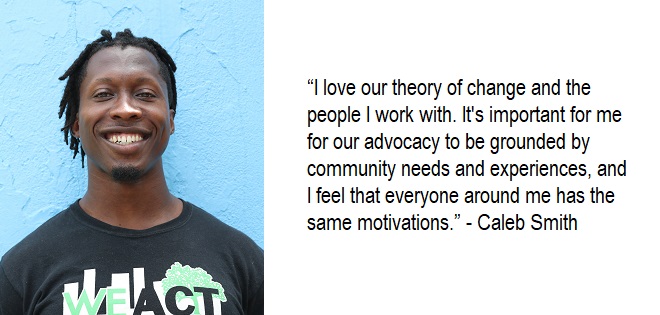
While the deadline for our next cohort of fellows has already passed, you can support the fellowship by clicking here.

Rachel Wissner is the Individual Giving Manager at WE ACT for Environmental Justice.
